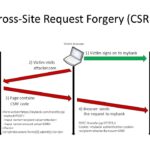Cross-Site Request Forgery is a term you’ve properly heard in the context of web security or web hacking, but do you really know what it means? The OWASP definition is as follows: Cross-Site Request Forgery (CSRF) is an attack that forces an end user to execute unwanted actions on a web application in which they’re […]
csrf
xssless – An Automated XSS Payload Generator Written In Python
xssless is an automated XSS payload generator written in python. Usage Record request(s) with Burp proxy Select request(s) you want to generate, then right click and select “Save items” Use xssless to generate your payload: ./xssless.py burp_export_file Pwn! Features Automated XSS payload generation from imported Burp proxy requests Payloads are 100% asynchronous and won’t freeze […]
Hcon Security Testing Framework (HconSTF) v0.4 – Fire Base
HconSTF is an Open Source Penetration Testing Framework based on different browser technologies, Which helps any security professional to assists in the Penetration testing or vulnerability scanning assessment. It contains webtools which are capable of carrying out XSS attacks, SQL Injection, siXSS, CSRF, Trace XSS, RFI, LFI, etc. It could prove useful to anybody interested […]
Jarlsberg – Learn Web Application Exploits and Defenses
This codelab is built around Jarlsberg /yärlz’·bərg/, a small, cheesy web application that allows its users to publish snippets of text and store assorted files. “Unfortunately,” Jarlsberg has multiple security bugs ranging from cross-site scripting and cross-site request forgery, to information disclosure, denial of service, and remote code execution. The goal of this codelab is […]
PayPal Patches Critical Security Vulnerabilities
[ad] PayPal in the news again for a series of fairly high-profile vulnerabilities discovered by the same guy that found the XSS bugs in Google Calendar and Twitter (Nir Goldshlager). I’m glad people are looking at PayPal as I’m sure the volume of monetary transactions that pass through their site on a daily basis is […]

